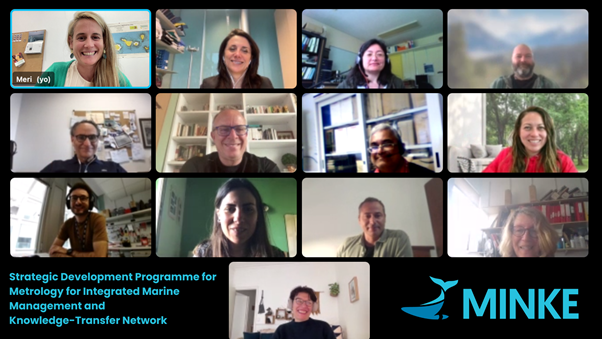he MINKE consortium participated in a workshop about its future Strategic Development Programme for Metrology for Integrated Marine Management and Knowledge-Transfer Network, led by the University of Bicocca (Milano). This workshop, which followed the in-person sessions held on January 24, continued to define its future.
During this online session, partners discussed about the fundamentals and key actions of the MINKE project. MINKE’s mission is to develop new and advanced metrological methods for marine instrumentation and observation systems. The consortium agreed that MINKE offers a unique and comprehensive perspective on metrology, placing significant importance on data traceability and completeness to ensure high-quality information.
Over the past years, the project has achieved several key milestones, and it will continue to strive to fulfil its core objectives in the coming years. These are outlined below.
Improving the accuracy of ocean data
There is a lack of information about measurement uncertainty in marine observations—in other words, how far the actual measurement deviates from the intended measurement. This is particularly important in ocean research since harsh marine environments can cause instruments to degrade over time. This information is a problem when it is propagated to fit forecasting models or other external uses.
The MINKE project emphasizes the importance of taking ocean measurements accurately. This means recording the measurements themselves and being aware of the uncertainty surrounding the data. In this sense, collaboration between ocean scientists and metrologists—researchers dedicated to the scientific study of measurement itself—is essential.
Metrological laboratories perform calibrations to ensure the accuracy of marine measurement instruments. This important piece has been missing from the ocean research landscape until now. One of the core objectives of MINKE is to facilitate collaboration between marine scientists and metrologists.
Leveraging citizen science to generate truly complete datasets
One factor holding back marine research is the lack of complete, comprehensive datasets. The ocean is vast, and the instruments used to collect data are expensive. As a result, there are relatively few high-quality sensors, which makes it difficult to extrapolate accurately.
For example, along the 580km of the Catalonian coast, there are just two high-quality ocean sensors. While these instruments collect in-depth information about their specific location, they do not offer insights into variations across the local marine environment.
One of the objectives of the MINKE project is to improve the completeness of marine datasets by encouraging everyday citizens to take part in the data collection process. Activities such as snorkelling, scuba diving, paddle boarding, and more, can be adapted for research purposes. For instance, a scuba diving school may offer its customers the option to photograph marine wildlife, or record data such as salinity or pH levels, for scientific purposes. This data can then be quality-checked against high-quality sensors and used in scientific repositories. As the project progresses, the goal is to promote public participation in marine science and greater ocean literacy. This in turn will lead people to become more invested in and take better care of marine environments. These participatory processes and contributions are known as citizen science.
The MINKE project will improve the accuracy and completeness of marine datasets, enabling the generation of comprehensive maps of essential ocean variables, such as biodiversity, marine litter, and more.
Building a pioneering and self-sustaining network in marine metrology
The MINKE project is currently supported as a “starting community” by the European Commission. At this stage, the goal is to establish a robust network which clearly demonstrates the added value of working together. The project aims to develop an advanced research infrastructure in the longer term. This can take the form of a European Research Infrastructure Consortium (ERIC), which is a recognized legal entity under European law.
This would entail not just the continued collaboration of the MINKE stakeholders beyond the project, but also the expansion of the community to include other key players across diverse ecosystems. Part of this involves creating world-class learning environments for the next generation of marine scientists. This will help communicate the need for accuracy and completeness in marine research and attract future talent to join this growing community.
Overall, the aim is to establish a network that can be maintained over time with sustainable, long-term sources of funding. Currently, there is no network specifically devoted to metrology in marine science, so this would be a pioneering initiative.
The MINKE project was launched with the support of the European Commission within the Horizon 2020 Programme (2014-2020), Grant Agreement No. 101008724. This INFRAIA initiative brings together 16 European marine metrology research infrastructures as well as other key stakeholders to create a new starting community and framework for marine research.



